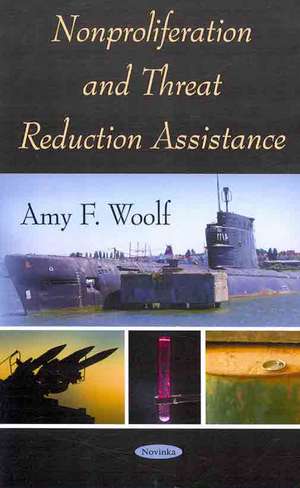Nonproliferation and Threat Reduction Assistance
Autor Amy F. Woolfen Limba Engleză Paperback – 30 sep 2008
| Toate formatele și edițiile | Preț | Express |
|---|---|---|
| Paperback (2) | 97.46 lei 3-5 săpt. | |
| CREATESPACE – | 97.46 lei 3-5 săpt. | |
| Nova Science Publishers Inc – 30 sep 2008 | 289.76 lei 3-5 săpt. |
Preț: 289.76 lei
Preț vechi: 391.46 lei
-26% Nou
Puncte Express: 435
Preț estimativ în valută:
55.45€ • 60.42$ • 46.72£
55.45€ • 60.42$ • 46.72£
Carte disponibilă
Livrare economică 02-16 aprilie
Preluare comenzi: 021 569.72.76
Specificații
ISBN-13: 9781604568493
ISBN-10: 1604568496
Pagini: 91
Ilustrații: tables
Dimensiuni: 136 x 216 x 8 mm
Greutate: 0.16 kg
Ediția:New.
Editura: Nova Science Publishers Inc
ISBN-10: 1604568496
Pagini: 91
Ilustrații: tables
Dimensiuni: 136 x 216 x 8 mm
Greutate: 0.16 kg
Ediția:New.
Editura: Nova Science Publishers Inc
Cuprins
Preface; Introduction; Background; The Nunn-Lugar Amendment; A Slow Start; An Evolving Program; Department of Defense Cooperative Threat Reduction Program; Program Objectives; CTR Funding; CTR Projects; Chain of Custody; Destruction and Dismantlement; Demilitarisation Programs; State Department; Nonproliferation of WMD Expertise (Science and Technology Centers); Export Control and Related Border Security Assistance; Department of Energy; International Nuclear Materials Protection and Cooperation; MPC&A Funding; MPC&A Projects; Global Initiatives for Proliferation Prevention (formerly Russian Transition Initiative); Initiatives for Proliferation Prevention; Nuclear Cities Initiative (NCI); Elimination of Weapons-Grade Plutonium Production; Fissile Materials Disposition; Issues for Congress; Organisation and Coordination; Strategic Plan; Program Coordination; Access and Transparency; Liability Protections and the Umbrella Agreement; Certifications and Waivers; Funding and Focus of the Programs; Funding; Focus; Globalisation and International Cooperation; The G-8 Global Partnership; Extending CTR Beyond the Former Soviet Union; Global Recognition of National Responsibility; Index.
